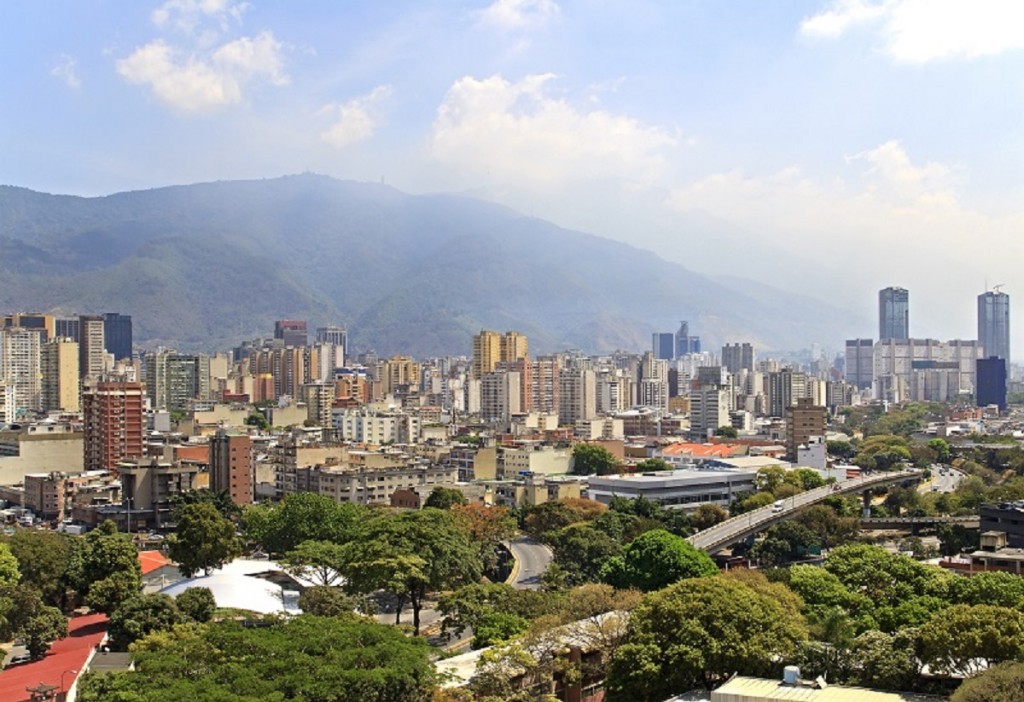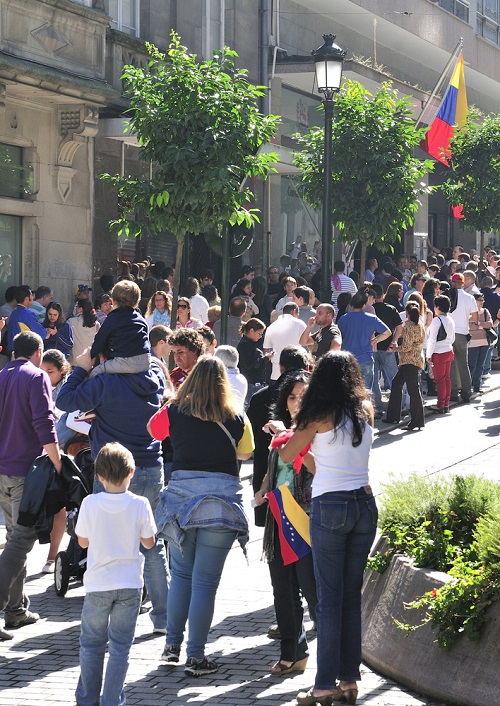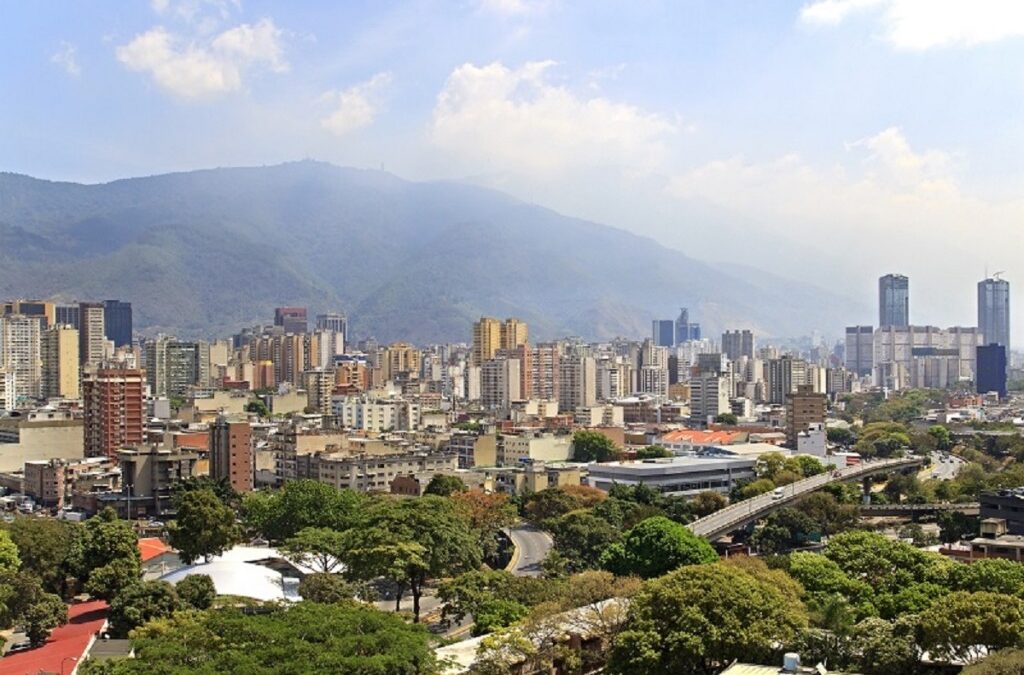by Dr Matt Wilde, ILAS Stipendiary Fellow 2013-14
The last few months have been testing times for Venezuelans. In February a series of anti-government protests broke out across the country, igniting social tensions that had been simmering since the death of Hugo Chávez and the election of his successor, Nicolás Maduro, in April 2013. Initially beginning among students in the western state of Táchira, demonstrations soon emerged in Caracas and other major urban centres, where predominantly middle-class protestors took to the streets to condemn high inflation, food shortages and insecurity. Led by Leopoldo López and Maria Corina Machado, radical sectors of the opposition seemed intent on stoking tensions in order to destabilise the government.

President Maduro laid the blame at the door of Washington, accusing the US government of providing financial backing for his opponents. As the protests escalated between February and April, violent clashes involving security forces, opposition protestors and government supporters led to numerous deaths, feeding a frenzy of accusation and counter-accusation that played out across social media and in the national and international press.
The polarised nature of media coverage on Venezuela poses serious challenges for those attempting to make sense of the situation from afar. The government is often caricatured or demonised by large swathes of the international media, but the responses from its supporters can also be overly defensive and lacking in critical distance. Although some would call for a “balanced mid-ground”, I’m not convinced that this is either possible or desirable in the Venezuelan case. There are real material interests at stake, as well as long-standing patterns of exclusion and inequality that, in spite of the high rates of social spending in the Chávez era, continue to produce significant social divisions. I do think, however, that those interested in getting beyond the surface-level accounts offered by many journalists should take the time to navigate some of the better-informed viewpoints out there.
With this in mind, I came up with a short guide to better understanding Venezuela and its current situation. These steps are by no means exhaustive, but they should help interested observers get a more nuanced and analytical picture than they’re likely to find in much of the international media.
1. Treat the mainstream media with caution
It’s not that journalists never come up with useful analysis, but it is the case that they are often constrained by the need to fill fairly small columns with the most blockbuster stories they can find. This means that opportunities for representing the complexity of events and the diversity of viewpoints within Venezuela are relatively few. It’s also worth bearing in mind that the majority of international journalists who cover the country base themselves in the most salubrious districts of Eastern Caracas such as Altamira and Los Palos Grandes, where they tend to mix with diplomats, business leaders and other foreign correspondents. As a result, their view of Venezuela is one heavily influenced by elite individuals and groups. Although many will make short trips to the popular sectors known as barrios to interview token supporters of the government, the overall tone of their coverage is heavily skewed in favour of elite opposition voices. When “the poor” are mentioned, they are often represented as an uncritical mass whose connection to chavismo is largely emotive. This is not only an inaccurate picture, it’s also one that flattens out the complexity of everyday life in Venezuela: some of the most insightful commentaries come from critical voices outside of elite opposition circles.
2. Diversify your news sources
If you’re hoping to find the “real objective truth” of what’s happening in Venezuela, you may be searching for a long time. Class, political affiliation and choice of media outlet hugely shape the way that people view events inside the country. Those living just a few miles apart in the same city will have dramatically different interpretations depending on whether they use pro- or anti-government media. As such, it may be better to think of the situation as one characterised by a series of overlapping and often competing political subjectivities, each of which is shaped by a given individual’s position in society. The trick is to understand these viewpoints contextually, creating a kind of mosaic of opinion that also illuminates the socio-political makeup of the country as a whole.

Still, some commentators are better than others, so it’s worth applying some filters. If I’m looking for some of the more considered opposition viewpoints, I tend to turn to Caracas Chronicles, which offers regular commentaries on current events. Funnily enough, the blog provides its own “Beginner’s Guide to the Chávez Era”, although the sources listed are all skewed towards an opposition angle. There is also The Devil’s Excrement blog, which has some useful economic analysis of government policy. On the pro-government side, venezuelanalysis.com offers a daily news and analysis service, including links to open access academic articles. Spanish speakers should also check out aporrea.org, which hosts news items, debate and forums for those broadly aligned with the government. This is a particularly good site if you want to understand the discussions and criticisms that take place within chavismo. Critical voices to the left of the government, which are unfortunately rarely mentioned by anyone outside of Venezuela, can be found on websites such as La Clase, the anarchist periodical El Libertario and Indymedia Venezuela.
3. Follow academics on Twitter
Social media has its dangers, but an excellent way of making productive use of it is to follow the growing number of Venezuelanist academics on Twitter, who provide informed commentaries that will usually be a lot more useful than the Guardian or the BBC. They also provide links to the better journalistic pieces, thus offering a readymade media filter. Don’t expect them all to agree, however, because they won’t. But you can at least be assured that their analysis is based on empirical research and a lasting effort to understand the country in all its rich complexity. Here’s a list of those I follow: Steve Ellner, Julia Buxton, Luis Vicente Leon, Pablo Navarrete, George Ciccariello-Maher, Miguel Tinker Salas, Hugo Peréz Hernaíz, Alejandro Velasco, Rebecca Hanson, Margarita López Maya, Rafael Uzcátegui and David Smilde, who runs a very informative blog called Venezuelan Politics and Human Rights.
4. Sign-up to Latin American news and events bulletins
Of these, LATAM-INFO is probably the most comprehensive in terms of events, but Canning House, Latin America Bureau and the North American Congress on Latin America are also useful resources. Attending events about Venezuela will provide a depth you’re unlikely to find in media coverage, although bear in mind that the “mosaic approach” described above should be applied to these just as much as any text you might read.
5. Buena suerte pues…
Ultimately, your view on Venezuela is likely to be shaped by your existing political identity and broad worldview. While this is inevitable to some degree, for those who are really interested in understanding the country, I think it’s worth taking the above steps even if your view is already set. It’s a good way of crosschecking accounts and challenging the origins of your own viewpoints.
To get you started, here are some of the articles that I’ve found the most useful and interesting as I’ve followed the current situation. Again, don’t expect a uniformity of position, because you won’t find one:
Alejandro Velasco provides an excellent overview of the situation
George Ciccariello-Maher analyses the protests via CLR James’s Black Jacobins
Mark Gonzalez with a trenchant leftist critique of the current government
Gregory Wilpert explains the complexities of Venezuela’s high inflation and its oil economy
Rafael Uzcátegui provides an anarchist view from within Venezuela
Verónica Bayetti Flores brings feminism to the fore and demands a nuanced analysis of the situation
Dorothy Kenwick analyses the Venezuelan economy and class polarisation
Mark Weisbrot rebuts Kenwick’s claims, interpreting the data in very different terms


Recent Comments